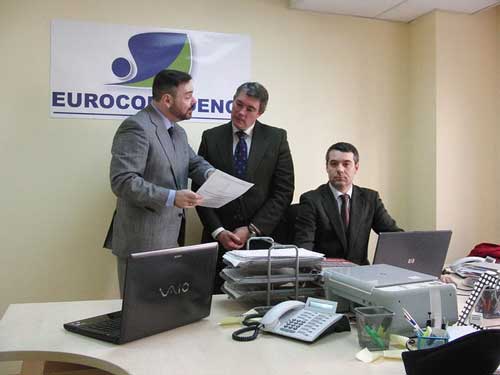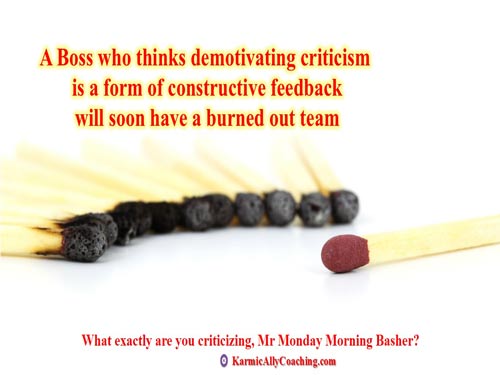This post has already been read 6039 times!
Nobody likes to be criticized.
Receiving feedback or constructive criticism, yes but being criticized?
Emphatic NO!

Bossy feedback
By being too critical, the message is lost on the receiver who hears the bad parts and goes into defensive mode.
Even if there is some truth in the criticism, it gets lost in the communication. Instead of improved performance, conflicts grow which only hamper productivity both for the individual and the organization.
The Boss who excelled in Monday Morning Bashing
The other nice thing about Manager was that he was democratic in meting out Monday Morning Bashing. The team was bonded by confusion and analysis sessions post bashing.
I leave it to the reader to figure out how productive our Mondays were!
Somewhere along the line, Manager must have learned about sandwiching criticism, so the dialogue would have gone like this.
Manager “Good morning, You did a great job getting out the report on Friday”
Subordinate “Thank you, I did my best”
Manager “You met the deadline, but it was the worst report I have ever read. It is blah blah. Everyone says it is this that and the other” (and lots of generalizations)
Subordinate (In stunned silence trying to figure out what is being said)
Manager “Well, do better next time. Keep up the good work”.
The above dialogue is a sanitized version of what actually used to happen.
When I joined the department, I was stunned the first few times and coped thanks to the camaraderie of old veterans of Monday Morning Bashing who were supportive. I was advised to ignore it and just focus on my work.
Going to Human Resources was not considered an option because Manager exercised great clout with the higher ups. Those who could not handle it left for greener pastures.
I must have gotten out from the wrong side of my bed one Monday
Because I found my voice during my allotted session. Saturated beyond my limits, I asked a simple question
“What exactly have I done wrong? Please give me an example”
Manager flustered and went into generalizations but by now I was not in the mood to let go.
Politely but firmly, I kept repeating my request, like a broken record, for specific examples.
I think Manager got the message because my sessions were always shorter and sometimes, I did get feedback for improvement. Others who followed the same method noticed the difference in their sessions too.

The Art of Negative Inquiry to Tackle Criticism
We had stumbled upon the art of using negative inquiry to tackle criticism.
In other words, we wanted to hear more negative talk.
We were willing to listen but retained the right to agree or disagree.
Tired of listening to vague and obtuse criticism, we wanted to get to the specifics of any problem and then deal with the problem.
Negative inquiry is an assertiveness skill. It has you do exactly the opposite of what you naturally feel like doing in the face of criticism.
Instead of going on the defensive, you try to get to the real issue which is bothering the criticizer.
A good strategy is to firstly listen to the criticism.
Then absorb it by either agreeing with the criticism or the principle. After that, seek clarifications without getting upset or going on the defensive.
Could you please give me a specific example?
Please tell me more; I want to understand this better
What specifically/exactly did I do?
When asked to offer clarification, the criticizer has to step back and take on the burden of explaining himself better.
Like Fogging, the critic might actually back off since it is quite exhausting to continue criticizing someone who is not reacting in the manner the critic would like.
It might also lead to getting more information to reach the crux of the matter and finding a solution with minimum conflict and bad blood, especially if you are dealing with a boss who is a micro-manager.
Have you experienced the Monday Morning Basher treatment? How would you suggest an employee handle it?
Being Assertive is easier when you have a good sense of self-confidence and high self-esteem. You will learn this in my Kindle book Self Confidence in 8 Steps.
Learn more about this Self-Help Book by clicking the image of the book below. The book is available in all Amazon markets.
Transparency Notice: If you purchase a product through a link on my site, there’s a good chance I’ll receive some kind of “thank you money” from the company I referred you to.
For more details, check out my full disclosure in this website’s Privacy Statement (there is also a link at the bottom of every page)




 I adhere to the Certified Coaches Alliance Code of Ethics and Standards. A copy is available on request.
I adhere to the Certified Coaches Alliance Code of Ethics and Standards. A copy is available on request.
 Let's Talk through the Connect Form:
Let's Talk through the Connect Form:
Great reminder and so long since I was in that situation. I do love the art of Negative Inquiry , sharing as this will touch many people xx
Thanks Suzie. Reading the visitor comments for this post, I realize that many of us who might not have even met in the offline world have had this experience making the Art of Negative Inquiry even more important for people who are presently experiencing such situations but not sure how to handle it. A big thank you for sharing the message with your audience.
Asking for a specific example and to be told more — when asked without tone — are so powerful! Thanks for the reminder. Sharing…
We’re open to receiving feedback when delivered in a manner that we can listen to it, Sue, not when it is done in a manner that it goes over our head. Specifics and a neutral tone make for more effective communication between the 2 parties.
Love your blog because it proves the old saying, “You catch more bees with honey than with vinegar.” I think most of us reading this blog remember getting a verbal spanking by a boss at one time or another. It was educational because it taught us what not to do to others. Thanks for reminding me.
Thanks Kathleen for sharing the old adage, Kathleen. It holds true for any engagement between 2 people. Looks like we all followed the ‘do unto others as you would have others do unto you’ after receiving the weird verbal bashing. 🙂 When we address our staff or subordinates in a manner that we would have preferred ourselves at that stage of our career, then we are already a rung above in the manager/leader ladder.
I’m still laughing from your “sandwich” example! Not that it is funny when you’re on the receiving end, but because I have BEEN THERE. A manager I worked for years ago had that routine down pat so every time she paid you a compliment, your stomach would go into knots just waiting for the shoe to fall on your head, and it always did.
The worst part was that she would wait days, sometimes weeks, to do this. So there you would sit in front of her, like a kid that’s been called to the principal’s office, trying to remember the incident she’s berating you for, but she always quickly dismissed us so it was over as suddenly as it started and then we’d be walking out of her office in a fog still trying to figure out what the heck just happened!
I have never taken such pleasure at quitting a job as I did that one, but the experience was valuable because I went on to manage a 40 staff unit and never once used the “sandwich” on them!
Oh God, Marquita, is it possible that our boss and your boss are long lost siblings? 🙂 It was an ordeal in those days waiting for our ritualistic verbal bashing and yes, in a way I’m grateful for the experience. It taught me what I wasn’t supposed to do either as a Manager or as a Leader. Thanks for sharing your experience. I fully relate to it.
“Negative inquiry” is a great way to gain a clearer understanding, Vatsala. The sad thing is so many people just stand there and take the criticism and then ‘make up’ what it ‘really’ means. When it comes down to it, ultimately it is about open communication and feeling comfortable enough, even as an employee, to ask the questions that will offer insight and hopefully in the longer run, will benefit the manager, the employee and the company. Sounds like you were able to manage the manager very well!
You are so right, Beverley. Open communications and understanding how to deliver feedback or constructive criticism in a manner that the receiving party actually listens is an important managerial and leadership skill. I guess I did manage this manager well after recovering from his style of shock and awe feedback though I assure you, the first time it happened, I wasn’t quite sure what had hit me. 🙂
I had an admin who was like that. In the end, it was more about me outdoing her in her mind. How could a teacher have more knowledge than admin. It is quite possible. We are all here to learn from one another. xoxo
One never knows what’s going on in another person’s mind, Natasha, and all we can do is handle the outward projection of their feelings to the best of our abilities. The competition between a teacher and and admin person is puzzling, unless she felt you were competent to do both her job and yours. The best way to protect oneself is to be assertive and ask for specifics – that usually gets the other person’s goat- big time as I learned from the Monday Morning Basher. 🙂
I love the ‘negative inquiry’ technique, Vatsala. I have experienced plenty of critical types in my life. I love your reproduction of Manager’s “criticism sandwich” – it’s a great example of someone learning a technique on a completely superficial level – so proud of his ‘sophistication’ and completely unaware what a hash he is making of it! Maybe you should think of writing a show about this guy – he’s very funny, as long as he isn’t aiming his criticism directly at oneself!
Thanks, Reba. That guy was a nightmare (yes, he does exist in the real world) Wish I’d made more notes about him during the years when I worked in that team. 🙂